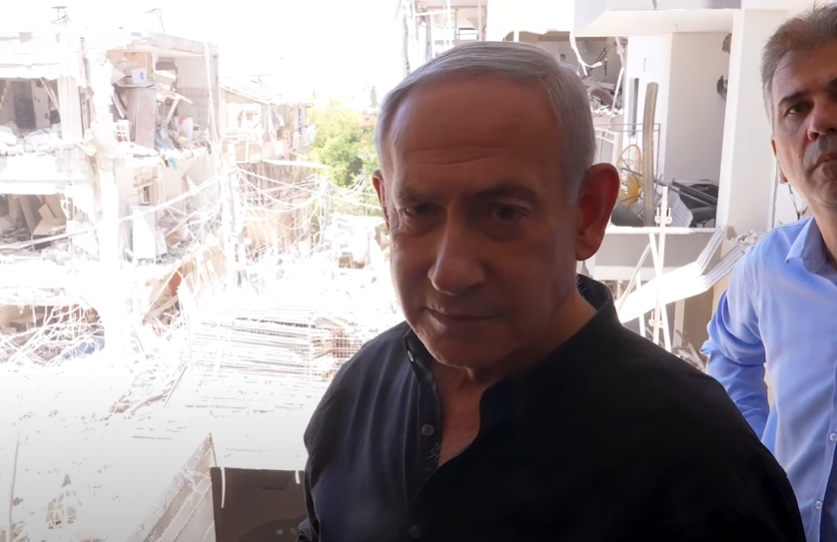Netanyahu Vows to Finish Fight With Iran:As the Israel-Iran war enters day 8, Netanyahu pledges to strike all Iranian nuclear sites, saying Israel won’t wait for U.S. approval. In a surprise move, President Trump pauses military threats, opens a 2-week window for possible diplomacy, and quietly withdraws nearly 40 U.S. aircraft from Qatar’s Al Udeid base. Iran rejects negotiations while Israeli strikes continue. Regional tensions escalate as the world watches.
Netanyahu Vows to Finish Fight With Iran, Trump Pauses Threats, Opens 2-Week Diplomacy Window
In a dramatic twist, President Trump has abruptly pulled back from the brink of full-scale military action against Iran. This surprising shift came only hours after he delivered one of his strongest threats yet. Now, with the war between Israel and Iran entering its eighth day, the White House has announced a two-week window for potential diplomacy. The world is left wondering whether this pause signals a genuine attempt at peace or is merely a brief calm before a greater storm.
As day eight of the Iran-Israel war unfolds, the situation on the ground remains dire. Sirens wailed over Tel Aviv and Tehran through the night as missiles lit up the skies. Hospitals have been set ablaze, nuclear sites are smoldering, and the global community watches with growing alarm. The devastation has led to one central question: has Trump blinked under pressure, or is he preparing for an even more massive military response?
For weeks, the United States had been ramping up its pressure campaign against Iran, hinting at possible military intervention. However, in a recent statement, President Trump introduced an unexpected diplomatic opening. Quoting directly from the president’s message: “Based on the fact that there’s a substantial chance of negotiations that may or may not take place with Iran in the near future, I will make my decision whether or not to go within the next two weeks.” This two-week window is now being watched closely by global observers as a critical period that could determine the course of the conflict.
At the same time, diplomatic activities are already underway in Europe. Iran’s Foreign Minister has arrived in Geneva to meet with representatives from Britain, Germany, France, and the European Union. However, ahead of these talks, Tehran has firmly stated its current position. The Iranian foreign minister made it clear that Iran is not interested in negotiating under present conditions. “Under the current circumstances and as the Zionist regime’s attacks continue, we are not seeking negotiations with anyone, especially not with the United States on this matter,” he said. Tehran further claims that it is the Americans who have repeatedly reached out to initiate negotiations, sending multiple and serious messages behind the scenes.
On the other side, Israel continues its aggressive campaign. The Israeli military recently released new images highlighting its latest strikes on Iranian targets. Prime Minister Benjamin Netanyahu remains defiant, stating that Israel will not wait for Washington’s approval to carry out its military operations. “I am determined that we will achieve all our goals, all their nuclear facilities. We can do this,” Netanyahu asserted. “The decision of President Trump, whether he wants to join or not again, is his decision. He will do what is good for the United States, and I will do what is good for the state of Israel.”
Amidst these tense developments, satellite imagery has revealed a telling move by the United States. Nearly 40 American aircraft have quietly been repositioned from Qatar’s Al Udeid Air Base. As of June 5th, dozens of US aircraft were visible at the base, but by June 19th, only three remained. This sudden withdrawal of air assets indicates Washington’s efforts to shield its forces from potential Iranian retaliation and to avoid being directly dragged into an even wider conflict at this stage.
The risk of regional escalation remains dangerously high. Leaders across the Middle East have been in constant contact, voicing deep concerns about how the ongoing conflict might spill over into neighboring countries. The fear is that even a small miscalculation could spark a much broader and uncontrollable war throughout the region.
Observers suggest that Trump’s sudden shift towards diplomacy may be driven by both domestic and international pressures. Within the United States, some elements of the Republican Party are urging caution, wary of plunging the country into another long and costly conflict in West Asia. Globally, allies and adversaries alike are watching anxiously, worried about the potential global ramifications of an expanded military confrontation.
As the clock ticks down on the two-week diplomatic window, uncertainty hangs heavily over the region. The world now waits to see whether this opening leads to meaningful negotiations or whether this brief pause is simply the calm before a much more violent storm erupts in the Middle East.
Description:
As the Israel-Iran war enters day 8, Netanyahu pledges to strike all Iranian nuclear sites, saying Israel won’t wait for U.S. approval. In a surprise move, President Trump pauses military threats, opens a 2-week window for possible diplomacy, and quietly withdraws nearly 40 U.S. aircraft from Qatar’s Al Udeid base. Iran rejects negotiations while Israeli strikes continue. Regional tensions escalate as the world watches.

